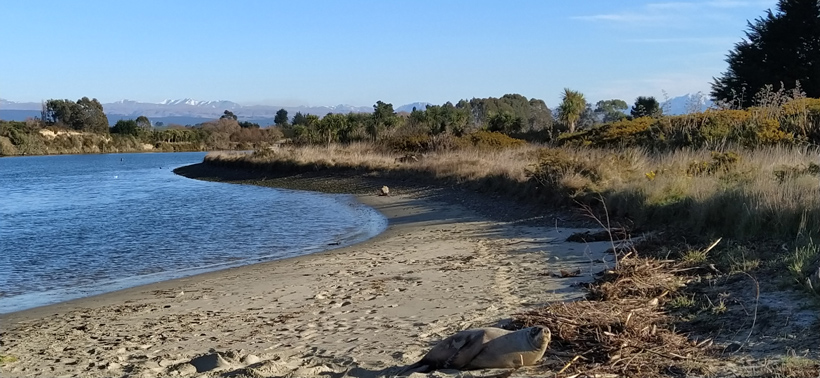Archived content: This media release was accurate on the date of publication.
Date: 03 September 2020
For the second year in a row, a male sea lion/whakahao has taken up residence in the North Otago village and is patrolling popular recreation spots.

Kakanui is becoming a popular spot for sea lions, with one frequenting the beach and river for the second year in a row
Image: DOC
Department of Conservation Ranger Tom Waterhouse says although it's exciting to see these taonga species returning to the mainland, it can be alarming when they pop up nearby unexpectedly.
"The return of New Zealand sea lions to Otago is a good news story for a threatened endemic species which was hunted to the point of extinction. A lot of hard work by a great many people and groups over the years has helped bring them back to a point where we are starting to see them re-establish breeding colonies on mainland New Zealand.
"However, with males tipping the scales at up to 450 kg, an alarming-sounding bark and an appearance that belies their capacity for on-land speed, an unexpected encounter can be very confronting."
Because of this, river and beach users are asked to be extra vigilant – even inland.
"Sea lions are very mobile on land and can push a long way inland from the sandy beaches they love. This means many people encounter them in places they least expect. In fact, because they have been gone so long from Mainland New Zealand we - and perhaps the sea lions themselves - are still learning what habitats they prefer here."
While the sea lion does appear to be spending time at whitebait spots, travelling as far as 2.5 km upstream of the Kakanui river mouth, punters can be assured it's not pinching prospective patties.
"Sea lions are incredibly smart. Some have cued on to the late winter and spring abundance of fish – like trout - that congregate in estuaries and at river mouths. Like whitebaiters, many fish species will cash in on the migration of juvenile galaxias, and the sea lions come to cash in on the fish."
With population numbers increasing on the mainland, it's likely we will see more sea lions along coastal locations, so it's more important than ever people know what to do should they come across or be confronted by one.
"Unlike fur seals, New Zealand sea lions are not afraid of people. Rather than run away, they will charge at you if you get too close. Keep a reasonable distance and they are unlikely to bother you, especially when they are resting. It is important to realise the charge is usually a bluff, indicating you have invaded their personal space. Back off slowly and they are unlikely to pursue you far.
"If you have a bag or bucket you can hold this between you and the sea lion like a shield as you back away. For more permanent set-ups you would rather not have to move away from consider having a sheet of plywood you can use as a shield. Ever tried to argue when you are faced off with a sheet of plywood…? It is pretty boring. The key is not to aggravate or stimulate the sea lion. They will eventually lose interest and go away.
"Don't feed them, don't run, don't engage with them – essentially be as boring as possible. And as always, keep your dogs under control at all times."
New Zealand sea lions are one of the rarest sea lion species in the world and are only found in New Zealand, with most of the population residing at Auckland and Campbell islands in the NZ subantarctic.
What should I do if I encounter a sea lion?
Follow these simple guidelines.
- Always stay at least 10 m away (10 m from sleeping sea lions and 20 m from active sea lions). If you come across sea lions on the track, back off and find a different route.
- Do not disturb sea lions – do not make loud noises, throw things at them or drive vehicles in their vicinity.
- Keep dogs well away and on a lead around sea lions.
- Keep children under close supervision.
- If you're in a group, do not surround sea lions.
- Be prepared to back away if a sea lion takes an interest in you.
- If a sea lion approaches you in the water, avoid looking it the eye and move slowly away.
- Never attempt to handle sea lions.
- Do not feed sea lions.
- Let DOC know if you're concerned about the safety of a sea lion, or to report inappropriate behaviour around them.
- Enjoy these impressive animals.
Contact
For media enquiries contact:
Email: media@doc.govt.nz